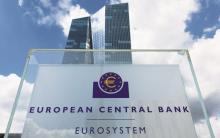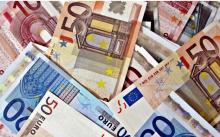The Intervention of ECB in the Eurozone Crisis
Banks are investing in bonds
Greek banks made new purchases of bonds and investment assets amounting to 9.3 billion euros in 2023, financed by the excess liquidity secured through the increase in deposits, as in the absence of sufficient demand for new loans the credit sector is looking for investment opportunities with high yields.
- Read more about Banks are investing in bonds
- Log in to post comments
ECB keeps rates on hold with inflation still sticky
The European Central Bank froze interest rates again on Thursday as it held off from starting to cut borrowing costs amid concerns that sticky inflation is not easing as fast as hoped.
The Frankfurt-based institution's governing council held the benchmark deposit rate steady at a record four percent for a fourth straight meeting, as widely expected.
ECB set to hold rates as inflation drifts downwards
For the first time in over a year, European Central Bank (ECB) policymakers are expected to decide against raising interest rates again when they gather in Athens on Oct. 26.
Once red-hot, inflation, driven by Russia's invasion of Ukraine in early 2022, has started to ease, while the outlook for the economy has worsened.
Banks partly wean themselves off ECB
Over the past year, the "big four" Greek banks - Alpha, Eurobank, National and Piraeus - have repaid €31.1 billion of the €50.9 billion they had drawn from the Eurosystem, that is, the European Central Bank and the central banks of the 20 eurozone countries, in the form of loans at favorable interest rates.
- Read more about Banks partly wean themselves off ECB
- Log in to post comments
ECB trims Greek bond holdings by €172 mln
The European Central Bank reduced its Greek bond holdings by €172 million in June and July, to €37.979 billion, €1.82 billion from its spring 2022 high of €39.8 billion.
The ECB had purchased these bonds as part of its Pandemic Emergency Purchase Program (PEPP) despite the fact that Greek debt was, and still is not, investment grade.
- Read more about ECB trims Greek bond holdings by €172 mln
- Log in to post comments
Bond yields reaching EU average
Greek bond yields have fallen fast and currently the 2- and 10-year-bonds are trading at around the European average, 3.31% and 3.8% respectively.
Since the European Central Bank (ECB) started raising its rates to fight inflation, Greek borrowing costs have dropped by almost 10%, even as other eurozone members have seen their own inching upward.
- Read more about Bond yields reaching EU average
- Log in to post comments
ECB ‘could hike rates or pause at next meeting’
The European Central Bank (ECB) could hike interest rates again or pause at its next meeting and any decision will depend on the latest data, president Christine Lagarde has said.
The central bank for the 20 countries that use the euro lifted borrowing costs for the ninth consecutive time on July 28 as it fights stubbornly high inflation.
- Read more about ECB ‘could hike rates or pause at next meeting’
- Log in to post comments
Greek debt agency plans four bond reopenings by year-end
Greece plans four bond reopenings via auctions in the second half of the year to boost liquidity on the secondary market, the Public Debt Management Agency (PDMA) said on Tuesday.








